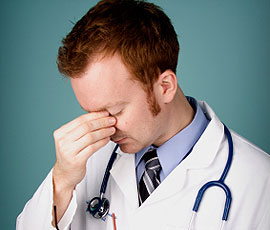
 From Dr. Toni Brayer at healthwise-everythinghealth.blogspot.com/2010/06/more-medication-errors-in-july.html" >Everything Health:
From Dr. Toni Brayer at healthwise-everythinghealth.blogspot.com/2010/06/more-medication-errors-in-july.html" >Everything Health:
We medical folks have always known that July is the worst time for a patient to be admitted to the hospital. It has nothing to do with nice summer weather or staff vacations. Although it cannot be proven, we think the answer to the mystery of July hospital errors is human — yes, it’s the new interns.
A new study published in the June issue of the Journal of General Internal Medicine looked at all U.S. death certificates from 1979 to 2006. They found that in teaching hospitals, on average deadly medication mistakes surged by 10 percent??each July. The good news is they did not find a surge in other medical errors, including surgery or in non-teaching hospitals.??
So let’s break this down. Every July a new crop of medical interns hit the wards. Eager, motivated and anxious to do well in their new white coats and carrying smart phones, they start seeing hospitalized patients. Each intern is paired with a medical resident, a young doctor a little further along in training. Some residents micromanage the interns and some are hands off. Some interns have very little supervision and have no experience in patient safety. With thousands of medications and tens of thousands of drug interactions, I am not surprised in the surge of mistakes in July.
In my day our pockets were stuffed with little notebooks and guides to diseases. The “Merck Handbook” and the “Washington Manual” were lugged from place to place so we could access information. It was laborious and not very effective. The new interns have iPhones and iPads with medical information accessible through the touch of a screen. If they order medications though a computer, there are fail-safes built in to help prevent medication errors. We will see if that makes a difference.
Everyone — patients and clinical educators –??needs to be aware of the “July Effect” and be extra cautious. Interns need increased supervision and nurses and patient families need to question everything! Hospital pharmacists should be making rounds with the teams and double checking all orders. The learning curve for interns is swift. We need to help them learn, while protecting patients.
No comments:
Post a Comment